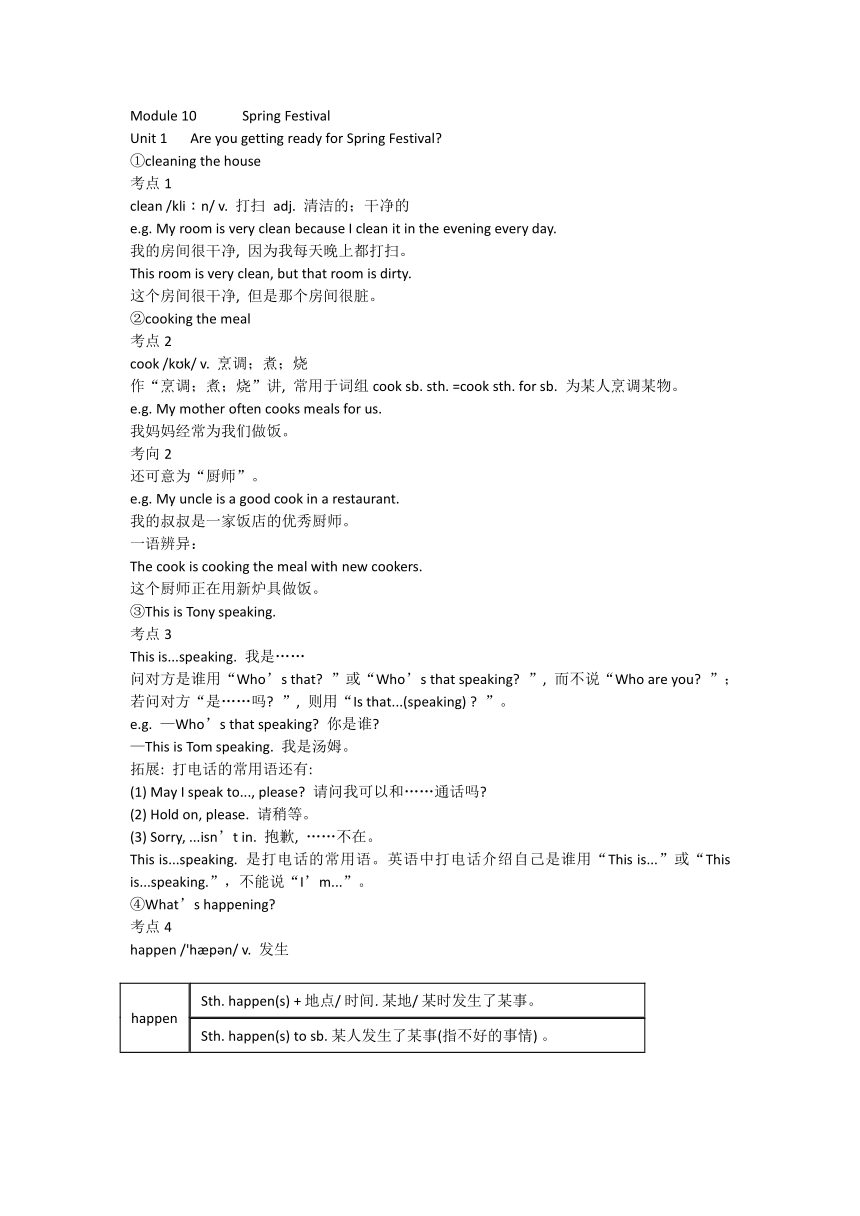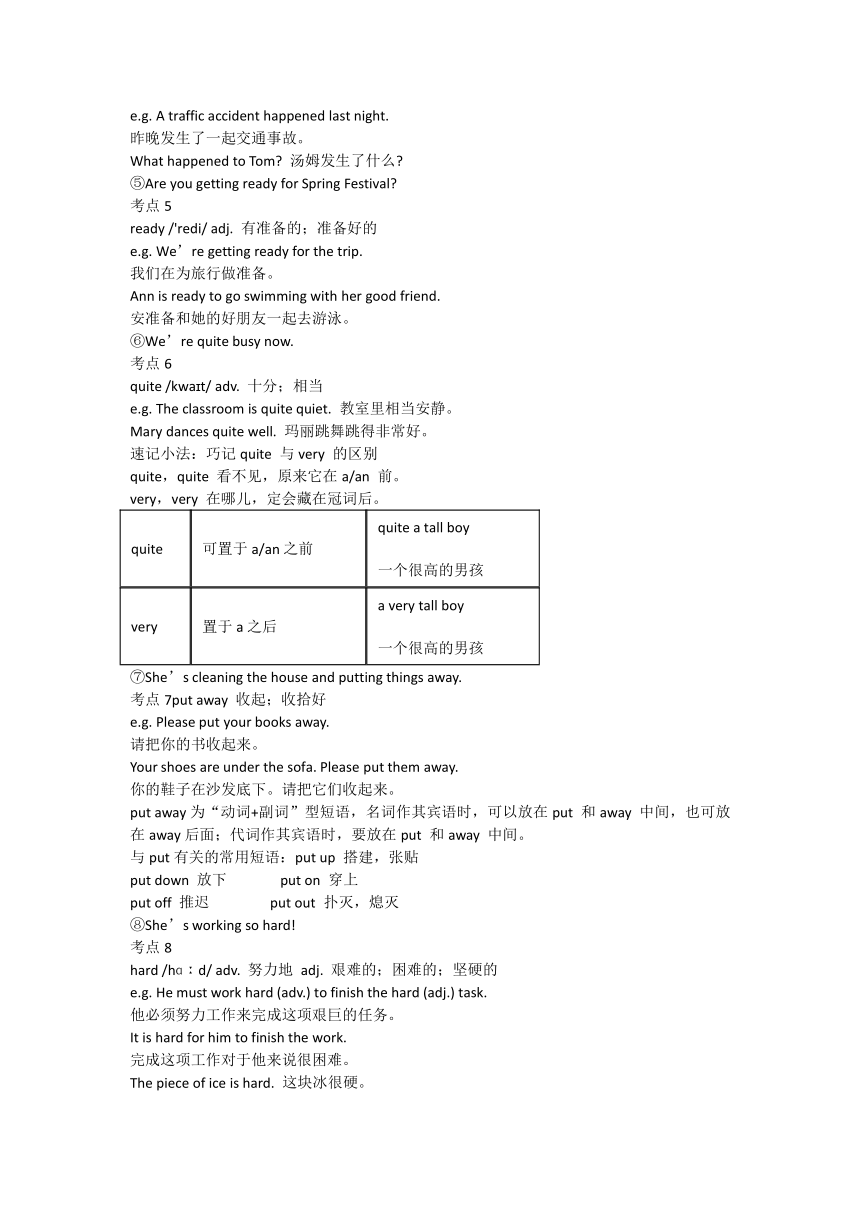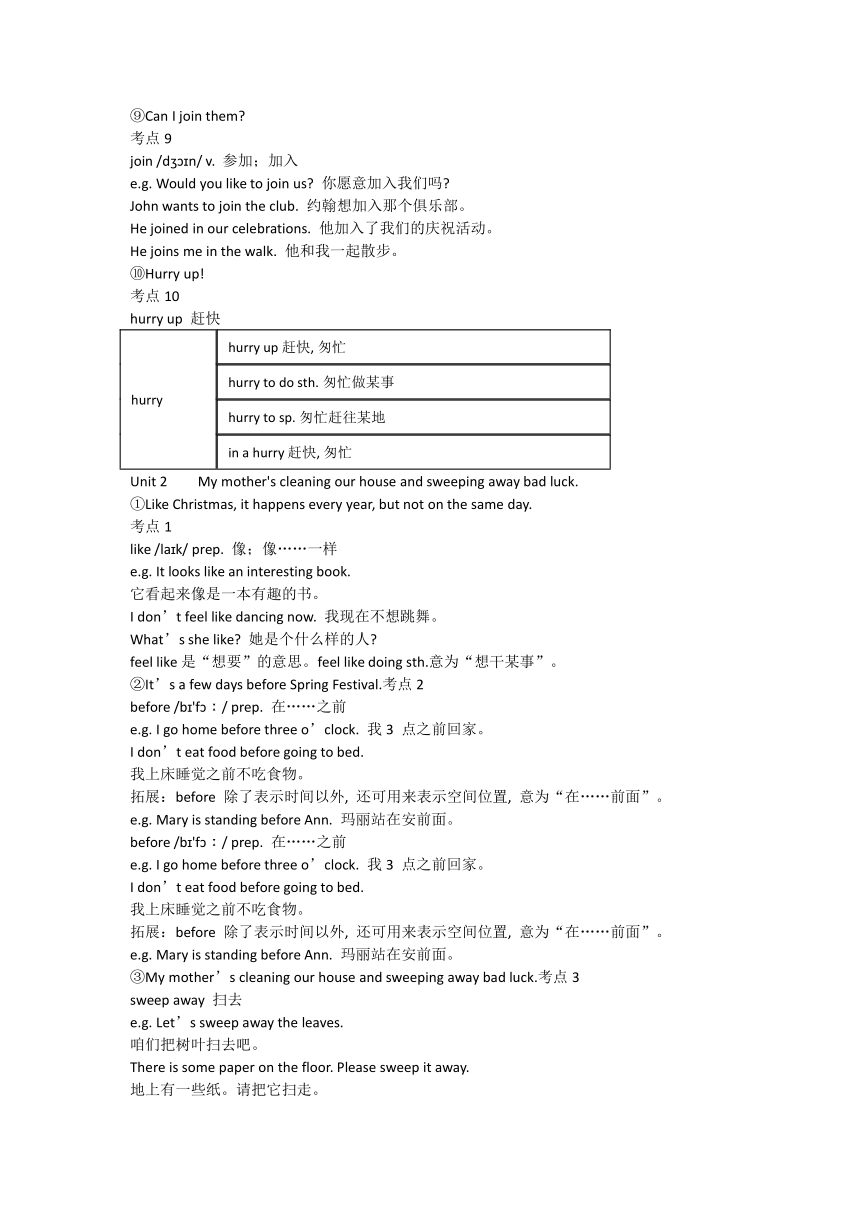Module 10 复习讲义 外研版英语七年级上册
文档属性
| 名称 | Module 10 复习讲义 外研版英语七年级上册 |  | |
| 格式 | docx | ||
| 文件大小 | 23.6KB | ||
| 资源类型 | 教案 | ||
| 版本资源 | 外研版 | ||
| 科目 | 英语 | ||
| 更新时间 | 2023-09-06 07:19:35 | ||
图片预览



文档简介
Module 10 Spring Festival
Unit 1 Are you getting ready for Spring Festival
①cleaning the house
考点1
clean /kli n/ v. 打扫 adj. 清洁的;干净的
e.g. My room is very clean because I clean it in the evening every day.
我的房间很干净, 因为我每天晚上都打扫。
This room is very clean, but that room is dirty.
这个房间很干净, 但是那个房间很脏。
②cooking the meal
考点2
cook /k k/ v. 烹调;煮;烧
作“烹调;煮;烧”讲, 常用于词组cook sb. sth. =cook sth. for sb. 为某人烹调某物。
e.g. My mother often cooks meals for us.
我妈妈经常为我们做饭。
考向2
还可意为“厨师”。
e.g. My uncle is a good cook in a restaurant.
我的叔叔是一家饭店的优秀厨师。
一语辨异:
The cook is cooking the meal with new cookers.
这个厨师正在用新炉具做饭。
③This is Tony speaking.
考点3
This is...speaking. 我是……
问对方是谁用“Who’s that ”或“Who’s that speaking ”, 而不说“Who are you ”;若问对方“是……吗 ”, 则用“Is that...(speaking) ”。
e.g. —Who’s that speaking 你是谁
—This is Tom speaking. 我是汤姆。
拓展: 打电话的常用语还有:
(1) May I speak to..., please 请问我可以和……通话吗
(2) Hold on, please. 请稍等。
(3) Sorry, ...isn’t in. 抱歉, ……不在。
This is...speaking. 是打电话的常用语。英语中打电话介绍自己是谁用“This is...”或“This is...speaking.”,不能说“I’m...”。
④What’s happening
考点4
happen /'h p n/ v. 发生
happen Sth. happen(s) + 地点/ 时间. 某地/ 某时发生了某事。
Sth. happen(s) to sb. 某人发生了某事(指不好的事情) 。
e.g. A traffic accident happened last night.
昨晚发生了一起交通事故。
What happened to Tom 汤姆发生了什么
⑤Are you getting ready for Spring Festival
考点5
ready /'redi/ adj. 有准备的;准备好的
e.g. We’re getting ready for the trip.
我们在为旅行做准备。
Ann is ready to go swimming with her good friend.
安准备和她的好朋友一起去游泳。
⑥We’re quite busy now.
考点6
quite /kwa t/ adv. 十分;相当
e.g. The classroom is quite quiet. 教室里相当安静。
Mary dances quite well. 玛丽跳舞跳得非常好。
速记小法:巧记quite 与very 的区别
quite,quite 看不见,原来它在a/an 前。
very,very 在哪儿,定会藏在冠词后。
quite 可置于a/an 之前 quite a tall boy 一个很高的男孩
very 置于a 之后 a very tall boy 一个很高的男孩
⑦She’s cleaning the house and putting things away.
考点7put away 收起;收拾好
e.g. Please put your books away.
请把你的书收起来。
Your shoes are under the sofa. Please put them away.
你的鞋子在沙发底下。请把它们收起来。
put away为“动词+副词”型短语,名词作其宾语时,可以放在put 和away 中间,也可放在away后面;代词作其宾语时,要放在put 和away 中间。
与put有关的常用短语:put up 搭建,张贴
put down 放下 put on 穿上
put off 推迟 put out 扑灭,熄灭
⑧She’s working so hard!
考点8
hard /hɑ d/ adv. 努力地 adj. 艰难的;困难的;坚硬的
e.g. He must work hard (adv.) to finish the hard (adj.) task.
他必须努力工作来完成这项艰巨的任务。
It is hard for him to finish the work.
完成这项工作对于他来说很困难。
The piece of ice is hard. 这块冰很硬。
⑨Can I join them
考点9
join /d n/ v. 参加;加入
e.g. Would you like to join us 你愿意加入我们吗
John wants to join the club. 约翰想加入那个俱乐部。
He joined in our celebrations. 他加入了我们的庆祝活动。
He joins me in the walk. 他和我一起散步。
⑩Hurry up!
考点10
hurry up 赶快
hurry hurry up 赶快, 匆忙
hurry to do sth. 匆忙做某事
hurry to sp. 匆忙赶往某地
in a hurry 赶快, 匆忙
Unit 2 My mother's cleaning our house and sweeping away bad luck.
①Like Christmas, it happens every year, but not on the same day.
考点1
like /la k/ prep. 像;像……一样
e.g. It looks like an interesting book.
它看起来像是一本有趣的书。
I don’t feel like dancing now. 我现在不想跳舞。
What’s she like 她是个什么样的人
feel like是“想要”的意思。feel like doing sth.意为“想干某事”。
②It’s a few days before Spring Festival.考点2
before /b 'f / prep. 在……之前
e.g. I go home before three o’clock. 我3 点之前回家。
I don’t eat food before going to bed.
我上床睡觉之前不吃食物。
拓展:before 除了表示时间以外, 还可用来表示空间位置, 意为“在……前面”。
e.g. Mary is standing before Ann. 玛丽站在安前面。
before /b 'f / prep. 在……之前
e.g. I go home before three o’clock. 我3 点之前回家。
I don’t eat food before going to bed.
我上床睡觉之前不吃食物。
拓展:before 除了表示时间以外, 还可用来表示空间位置, 意为“在……前面”。
e.g. Mary is standing before Ann. 玛丽站在安前面。
③My mother’s cleaning our house and sweeping away bad luck.考点3
sweep away 扫去
e.g. Let’s sweep away the leaves.
咱们把树叶扫去吧。
There is some paper on the floor. Please sweep it away.
地上有一些纸。请把它扫走。
考点4
luck /l k/ n. 运气
e.g. I think it can bring me good luck.
我认为它会给我带来好运。
— I’m going to have an English test.
我将要参加一场英语测试。
— Good luck to you! 祝你好运!
考向luck 的词形变换:
lucky adj. 幸运的 unlucky adj. 不幸运的
luckily adv. 幸运地 unluckily adv. 不幸运地
④We are celebrating Spring Festival with a traditional family dinner on the evening before Spring Festival.
考点5
celebrate /'sel bre t/ v. 庆祝
e.g. We celebrate Teachers’ Day in September.
我们在九月份庆祝教师节。
I like the celebrations of Spring Festival in China.
我喜欢中国春节的庆祝方式。
⑤There’s so much delicious food.
考点6
so much 如此多
e.g. I have so much homework to do every day.
我每天都有如此多的作业要做。
There are so many books in the library.
图书馆里有如此多的书。
⑥It means lucky money.
考点7
mean /mi n/ v. 意味着;意思是
What do you mean by... 该句型的意思是“你……是什么意思 ”
e.g. What does “celebrate” mean in Chinese
=What’s the meaning of “celebrate” in Chinese “celebrate”
在汉语中是什么意思
mean to do ... 打算干…… Lucy means to stay here for another week. 露西打算在这儿再待一周。
mean doing... 意味着…… It means wasting more time. 那意味着浪费更多的时间。
Unit 3Language in use
①Tell me about a festival in your country.
考点
tell /tel/ v. 讲;告诉
e.g. He tells me not to drive too fast.
他叫我(开车) 不要开得太快。
Let me tell you about my school life.
让我告诉你有关我学校生活的情况。
His mother often tells him a story before he goes to bed.
在他上床睡觉之前, 他妈妈经常给他讲故事。
tell 的用法:
① tell sb. (not) to do sth.告诉某人(不) 做某事
② tell a lie 说谎
③ tell A from B 区分A 和B
④ tell sb. sth.告诉某人某事
现在进行时(2)
考点1
现在进行时的疑问句形式
现在进行时的一般疑问句形式: “Am/Is/Are+ 主语+ 动词的现在分词 ”。
其肯定答语为: “Yes, 主语+am/is/are.”;
其否定答语为: “No, 主语+am/is/are+not.”。
考向2
现在进行时的特殊疑问句形式:
“特殊疑问词+am/is/are+ 主语+动词的现在分词 ”。
考点2
现在进行时与一般现在时的区别:
一般现在时 现在进行时
作用 (1) 表示一直发生的事情, 经常发生的动作。 (2) 表示客观事实或者真理。 (3) 谈论时间表、旅程表等。 (4) 谈论籍贯、国籍等。 (5) 询问或者引用书籍、通知或刚接到的信笺内容。 (1) 表示说话时正在发生或者正在进行的动作。 (2) 表示在目前相对较长一段时间内正在进行的动作, 但是说话时不一定在做的动作。
标志 sometimes, usually, never, always, often; every day/week/month/ year/...; on Sunday(s) / Monday(s) ; in the morning/afternoon/ evening; today 等。 now, at the moment, 另外, look, listen 等常常会引出现在进行时的句子。
构成不同 ① be 动词型: be 动词根据主语选择用am, is还是are。 ②实义(行为) 动词型: 主语+ 动词原形或第三人称单数形式。变疑问句或否定句时需用助动词do 或does。 现在进行时由“助动词be (am/is/are) + 动词的现在分词”构成。
Unit 1 Are you getting ready for Spring Festival
①cleaning the house
考点1
clean /kli n/ v. 打扫 adj. 清洁的;干净的
e.g. My room is very clean because I clean it in the evening every day.
我的房间很干净, 因为我每天晚上都打扫。
This room is very clean, but that room is dirty.
这个房间很干净, 但是那个房间很脏。
②cooking the meal
考点2
cook /k k/ v. 烹调;煮;烧
作“烹调;煮;烧”讲, 常用于词组cook sb. sth. =cook sth. for sb. 为某人烹调某物。
e.g. My mother often cooks meals for us.
我妈妈经常为我们做饭。
考向2
还可意为“厨师”。
e.g. My uncle is a good cook in a restaurant.
我的叔叔是一家饭店的优秀厨师。
一语辨异:
The cook is cooking the meal with new cookers.
这个厨师正在用新炉具做饭。
③This is Tony speaking.
考点3
This is...speaking. 我是……
问对方是谁用“Who’s that ”或“Who’s that speaking ”, 而不说“Who are you ”;若问对方“是……吗 ”, 则用“Is that...(speaking) ”。
e.g. —Who’s that speaking 你是谁
—This is Tom speaking. 我是汤姆。
拓展: 打电话的常用语还有:
(1) May I speak to..., please 请问我可以和……通话吗
(2) Hold on, please. 请稍等。
(3) Sorry, ...isn’t in. 抱歉, ……不在。
This is...speaking. 是打电话的常用语。英语中打电话介绍自己是谁用“This is...”或“This is...speaking.”,不能说“I’m...”。
④What’s happening
考点4
happen /'h p n/ v. 发生
happen Sth. happen(s) + 地点/ 时间. 某地/ 某时发生了某事。
Sth. happen(s) to sb. 某人发生了某事(指不好的事情) 。
e.g. A traffic accident happened last night.
昨晚发生了一起交通事故。
What happened to Tom 汤姆发生了什么
⑤Are you getting ready for Spring Festival
考点5
ready /'redi/ adj. 有准备的;准备好的
e.g. We’re getting ready for the trip.
我们在为旅行做准备。
Ann is ready to go swimming with her good friend.
安准备和她的好朋友一起去游泳。
⑥We’re quite busy now.
考点6
quite /kwa t/ adv. 十分;相当
e.g. The classroom is quite quiet. 教室里相当安静。
Mary dances quite well. 玛丽跳舞跳得非常好。
速记小法:巧记quite 与very 的区别
quite,quite 看不见,原来它在a/an 前。
very,very 在哪儿,定会藏在冠词后。
quite 可置于a/an 之前 quite a tall boy 一个很高的男孩
very 置于a 之后 a very tall boy 一个很高的男孩
⑦She’s cleaning the house and putting things away.
考点7put away 收起;收拾好
e.g. Please put your books away.
请把你的书收起来。
Your shoes are under the sofa. Please put them away.
你的鞋子在沙发底下。请把它们收起来。
put away为“动词+副词”型短语,名词作其宾语时,可以放在put 和away 中间,也可放在away后面;代词作其宾语时,要放在put 和away 中间。
与put有关的常用短语:put up 搭建,张贴
put down 放下 put on 穿上
put off 推迟 put out 扑灭,熄灭
⑧She’s working so hard!
考点8
hard /hɑ d/ adv. 努力地 adj. 艰难的;困难的;坚硬的
e.g. He must work hard (adv.) to finish the hard (adj.) task.
他必须努力工作来完成这项艰巨的任务。
It is hard for him to finish the work.
完成这项工作对于他来说很困难。
The piece of ice is hard. 这块冰很硬。
⑨Can I join them
考点9
join /d n/ v. 参加;加入
e.g. Would you like to join us 你愿意加入我们吗
John wants to join the club. 约翰想加入那个俱乐部。
He joined in our celebrations. 他加入了我们的庆祝活动。
He joins me in the walk. 他和我一起散步。
⑩Hurry up!
考点10
hurry up 赶快
hurry hurry up 赶快, 匆忙
hurry to do sth. 匆忙做某事
hurry to sp. 匆忙赶往某地
in a hurry 赶快, 匆忙
Unit 2 My mother's cleaning our house and sweeping away bad luck.
①Like Christmas, it happens every year, but not on the same day.
考点1
like /la k/ prep. 像;像……一样
e.g. It looks like an interesting book.
它看起来像是一本有趣的书。
I don’t feel like dancing now. 我现在不想跳舞。
What’s she like 她是个什么样的人
feel like是“想要”的意思。feel like doing sth.意为“想干某事”。
②It’s a few days before Spring Festival.考点2
before /b 'f / prep. 在……之前
e.g. I go home before three o’clock. 我3 点之前回家。
I don’t eat food before going to bed.
我上床睡觉之前不吃食物。
拓展:before 除了表示时间以外, 还可用来表示空间位置, 意为“在……前面”。
e.g. Mary is standing before Ann. 玛丽站在安前面。
before /b 'f / prep. 在……之前
e.g. I go home before three o’clock. 我3 点之前回家。
I don’t eat food before going to bed.
我上床睡觉之前不吃食物。
拓展:before 除了表示时间以外, 还可用来表示空间位置, 意为“在……前面”。
e.g. Mary is standing before Ann. 玛丽站在安前面。
③My mother’s cleaning our house and sweeping away bad luck.考点3
sweep away 扫去
e.g. Let’s sweep away the leaves.
咱们把树叶扫去吧。
There is some paper on the floor. Please sweep it away.
地上有一些纸。请把它扫走。
考点4
luck /l k/ n. 运气
e.g. I think it can bring me good luck.
我认为它会给我带来好运。
— I’m going to have an English test.
我将要参加一场英语测试。
— Good luck to you! 祝你好运!
考向luck 的词形变换:
lucky adj. 幸运的 unlucky adj. 不幸运的
luckily adv. 幸运地 unluckily adv. 不幸运地
④We are celebrating Spring Festival with a traditional family dinner on the evening before Spring Festival.
考点5
celebrate /'sel bre t/ v. 庆祝
e.g. We celebrate Teachers’ Day in September.
我们在九月份庆祝教师节。
I like the celebrations of Spring Festival in China.
我喜欢中国春节的庆祝方式。
⑤There’s so much delicious food.
考点6
so much 如此多
e.g. I have so much homework to do every day.
我每天都有如此多的作业要做。
There are so many books in the library.
图书馆里有如此多的书。
⑥It means lucky money.
考点7
mean /mi n/ v. 意味着;意思是
What do you mean by... 该句型的意思是“你……是什么意思 ”
e.g. What does “celebrate” mean in Chinese
=What’s the meaning of “celebrate” in Chinese “celebrate”
在汉语中是什么意思
mean to do ... 打算干…… Lucy means to stay here for another week. 露西打算在这儿再待一周。
mean doing... 意味着…… It means wasting more time. 那意味着浪费更多的时间。
Unit 3Language in use
①Tell me about a festival in your country.
考点
tell /tel/ v. 讲;告诉
e.g. He tells me not to drive too fast.
他叫我(开车) 不要开得太快。
Let me tell you about my school life.
让我告诉你有关我学校生活的情况。
His mother often tells him a story before he goes to bed.
在他上床睡觉之前, 他妈妈经常给他讲故事。
tell 的用法:
① tell sb. (not) to do sth.告诉某人(不) 做某事
② tell a lie 说谎
③ tell A from B 区分A 和B
④ tell sb. sth.告诉某人某事
现在进行时(2)
考点1
现在进行时的疑问句形式
现在进行时的一般疑问句形式: “Am/Is/Are+ 主语+ 动词的现在分词 ”。
其肯定答语为: “Yes, 主语+am/is/are.”;
其否定答语为: “No, 主语+am/is/are+not.”。
考向2
现在进行时的特殊疑问句形式:
“特殊疑问词+am/is/are+ 主语+动词的现在分词 ”。
考点2
现在进行时与一般现在时的区别:
一般现在时 现在进行时
作用 (1) 表示一直发生的事情, 经常发生的动作。 (2) 表示客观事实或者真理。 (3) 谈论时间表、旅程表等。 (4) 谈论籍贯、国籍等。 (5) 询问或者引用书籍、通知或刚接到的信笺内容。 (1) 表示说话时正在发生或者正在进行的动作。 (2) 表示在目前相对较长一段时间内正在进行的动作, 但是说话时不一定在做的动作。
标志 sometimes, usually, never, always, often; every day/week/month/ year/...; on Sunday(s) / Monday(s) ; in the morning/afternoon/ evening; today 等。 now, at the moment, 另外, look, listen 等常常会引出现在进行时的句子。
构成不同 ① be 动词型: be 动词根据主语选择用am, is还是are。 ②实义(行为) 动词型: 主语+ 动词原形或第三人称单数形式。变疑问句或否定句时需用助动词do 或does。 现在进行时由“助动词be (am/is/are) + 动词的现在分词”构成。
同课章节目录
- Starte
- Module 1 My teacher and my friends
- Module 2 My English lesson
- Module 3 My English book
- Module 4 My everyday life
- Module 1 My classmates
- Unit 1 Nice to meet you.
- Unit 2 I'm Wang Lingling and I'm thirteen years ol
- Unit 3 Language in use.
- Module 2 My family
- Unit 1 Is this your mum?
- Unit 2 These are my parents.
- Unit 3 Language in use.
- Module 3 My school
- Unit 1 There are thirty students in my class.
- Unit 2 The library is on the left of the playgroun
- Unit 3 Language in use.
- Module 4 Healthy food
- Unit 1 We've got lots of apples.
- Unit 2 Is your food and drink healthy?
- Unit 3 Language in use.
- Module 5 My school day
- Unit 1 I love history.
- Unit 2 We start work at nine o'clock.
- Unit 3 Language in use.
- Revision module A
- Module 6 A trip to the zoo
- Unit 1 Does it eat meat?
- Unit 2 The tiger lives in Asia.
- Unit 3 Language in use.
- Module 7 Computers
- Unit 1 How do I write my homework on the computer?
- Unit 2 When do you use a computer?
- Unit 3 Language in use.
- Module 8 Choosing presents
- Unit 1 I always like birthday parties.
- Unit 2 She often goes to concerts.
- Unit 3 Language in use.
- Module 9 People and places
- Unit 1 We're enjoying the school trip a lot.
- Unit 2 They're waiting for buses or trains.
- Unit 3 Language in use.
- Module 10 Spring Festival
- Unit 1 Are you getting ready for Spring Festival?
- Unit 2 My mother's cleaning our houses and sweepin
- Unit 3 Language in use.
- Revision module B
